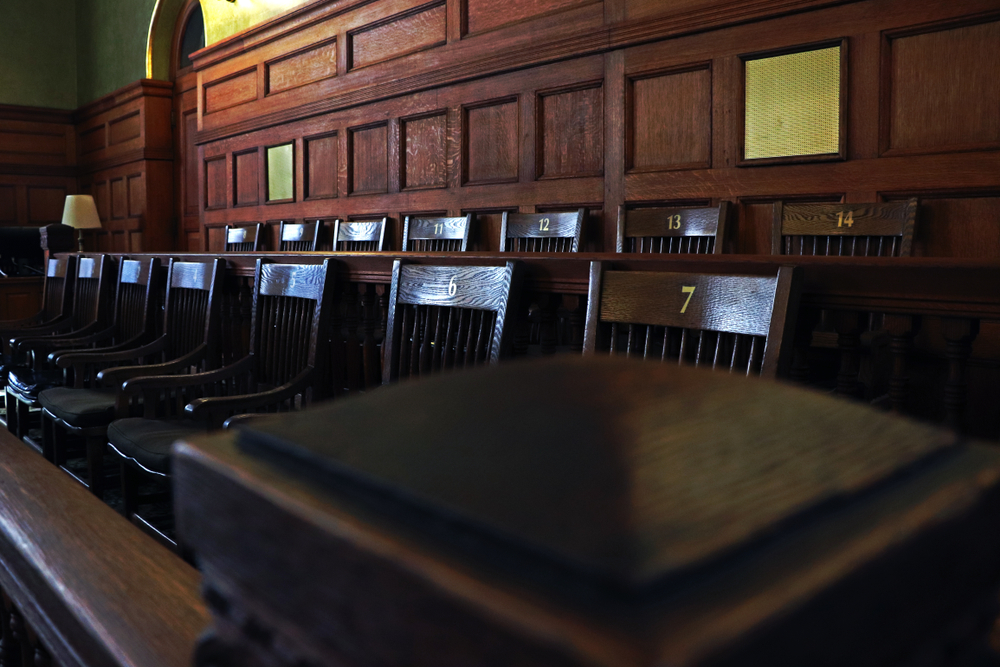 CLARION, Pa. (EYT) – The trial of Spencer Rudolph and Aaron Johnson entered its third day on Friday, with both the prosecution and the defense resting their cases before 11:00 a.m.
CLARION, Pa. (EYT) – The trial of Spencer Rudolph and Aaron Johnson entered its third day on Friday, with both the prosecution and the defense resting their cases before 11:00 a.m.
For the first day of the trial, including a list of the charges against the two men and an explanation of the circumstances around William Stout’s overdose death, click here.
For the second day of the trial, detailing activities outside of Clarion County, click here.

Left to right, Aaron Johnson and Spencer Rudolph. Photo by Dave Cyphert of ProPoint Media Photography
Prosecution Wraps Up Case
The prosecution brought three witnesses from the Monroeville Police Department. Detective Steve Maritz testified that he was part of a “trash pull,” which means police collected garbage from a residence under surveillance. He said he found items consistent with drugs and W2s belonging to two people, which defense counsel established did not belong to defendant Aaron Johnson. Officer Keith Pascarella said he observed the perimeter of the residence in Monroeville and made a traffic stop on Route 376. Detective Lieutenant Bill Krut testified that he observed the residence in Monroeville, observing Johnson leave the house in a jeep and drive to Oakland. The next day, he saw Johnson get into a car with Timothy Smith. Krut said he was involved with the traffic stop in which Smith and Johnson were arrested. Defense counsel asked if Krut saw specific signs related to drug trafficking, which Krut said was not observed at that time.
Retired State Trooper William Craddock took the stand. Before his retirement, Craddock worked for the State Police Vice Unit and testified to searching the residence of William Fourness. Craddock described the house as a single-wide trailer “perched” on piles of bricks without a full foundation. Inside, Craddock testified that the residence was “deplorable” with nothing organized. There was a lock box on the couch where drugs were found. Craddock was also at the search of the house in Monroeville that police say is connected to Johnson. In that house, they found drugs, drug paraphernalia, and a money counter. On cross-examination, defense counsel asked if Johnson’s fingerprints were found on items such as the money counter. Craddock said that they were no fingerprints found on any items, but there were numerous gloves present.
District Attorney Drew Welsh, representing the Commonwealth, rested his case after Craddock’s testimony. The time was around 9:50 a.m.
Defense Calls Witness and Rests
Attorneys Eric Jobe and Robert Taylor called Clarion Borough Chief of Police William H. Peck IV back to the stand. Peck had taken the stand on July 30. Jobe focused on several of the prosecution’s witnesses and attempted to identify discrepancies in their stories or the interviews conducted by the police, which included questions about dates, the definition of “a couple of months,” and the number of visits made to a dealer in Eastern Pennsylvania. With Fourness, Jobe pointed out that Fourness mentioned meeting at Penn Station sandwich shop in Monroeville, but that was not mentioned in Peck’s report. Welsh, on cross-examination, found that “multiple locations” were mentioned in the report, even though they were not specific. Jobe made a similar observation about Joseph Hoffman’s testimony, where Hoffman testified to meeting at a Giant Eagle. The specific location was not in Peck’s report, but the term “multiple locations” was in the report. In addition, Jobe pointed out that Fourness said that he lost money in Eastern Pennsylvania, as if a deal had gone bad. Hoffman testified that he had wrecked his car when making the trip to Eastern Pennsylvania, ending that deal.
Taylor pressed Peck on Hoffman’s interview, saying it was unlikely that an attorney would not have a second interview with police unless he could get something for his client. Peck did not deny that fact. Taylor also pointed out that Peck had to press Rudolph to get heroin mentioned in the interview and asked if Peck had said anything specific to Hoffman or his attorney. Peck said he just asked for the truth. Welsh asked Peck if he had told Hoffman what to say, and Peck said he did not.
When it came to the testimony of Ryan Gleixner, who testified that he led police to the Monroeville residence associated by police with Johnson, Jobe pointed out that Gleixner’s February interview never mentioned going to the house. Peck said that the information came in a later interview. In addition, Jobe said that Gleixner stated he called Fourness on the phone, but Jobe had Peck focus on a paragraph in the report that Gliexner said he texted Fourness. On cross-examination, Welsh found Gleixner’s comment about making phone calls in the next paragraph of the report.
The defense rested its case around 10:50 a.m.
Judge Sara Seidle-Patton determined that closing arguments, any rebuttal evidence, and her charge to the jury, would mean that the jury would not be able to deliberate until late in the day, so she called a recess until Monday, August 3.
Copyright © 2024 EYT Media Group, Inc. All rights reserved. Any copying, redistribution or retransmission of the contents of this service without the express written consent of EYT Media Group, Inc. is expressly prohibited.








